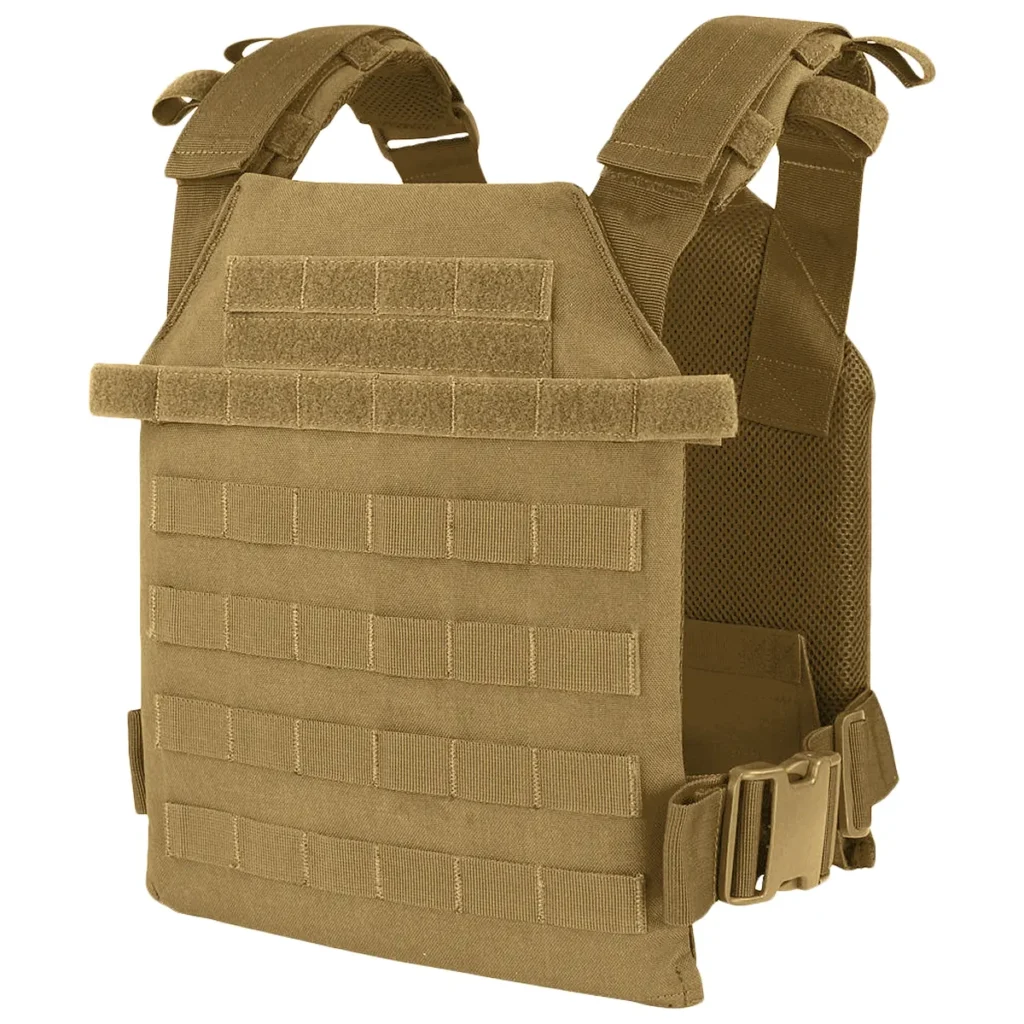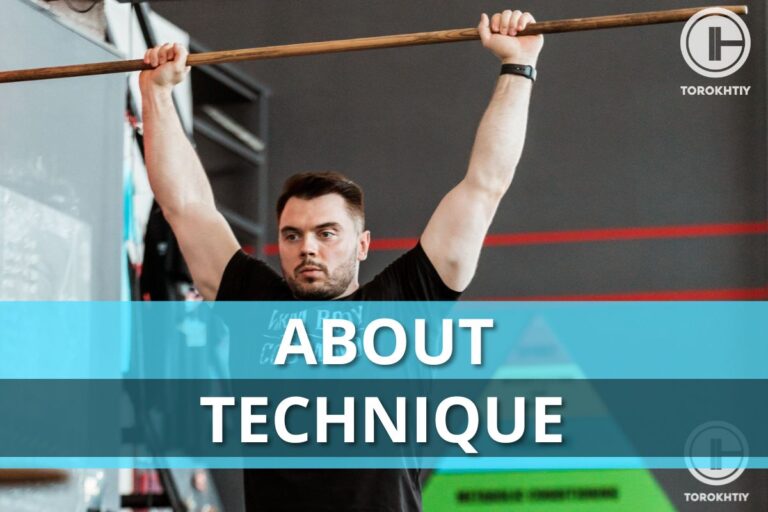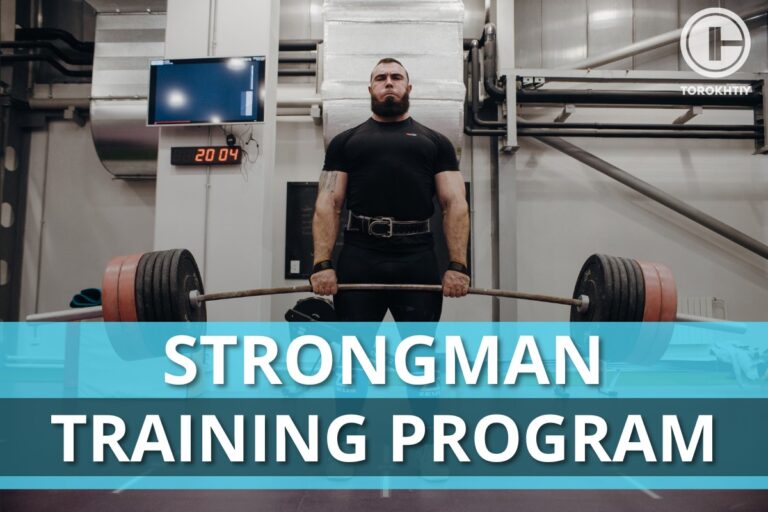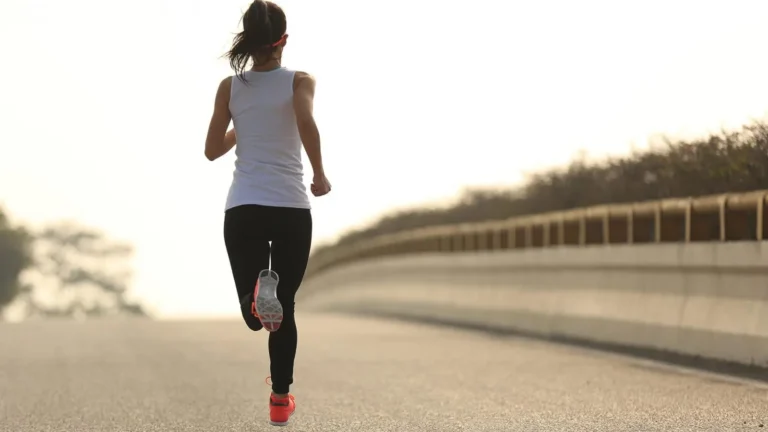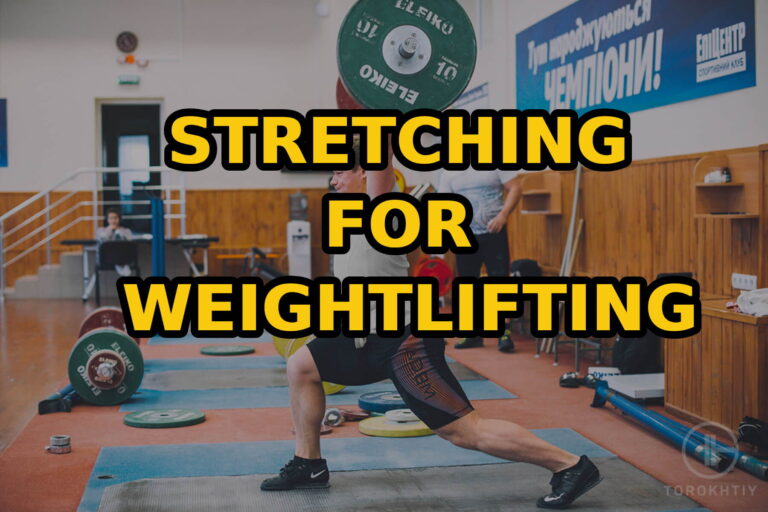Weighted Vest Workouts (10 Best Exercises)
Wearing a weighted vest makes some physical activities, like running and pull-ups, harder. It’s a great way to create balance and make resistance workouts harder. You can also use them with jumping and other types of rapid training.
If you don’t know what a “weighted vest” is, it’s exactly what it sounds like. It looks like a combat or fishing vest and often has places for storing extra weight. The weight of the vest varies, but it is usually between 12 and 150 pounds.
Weighted vest workouts can help you in several ways. But you also need to be careful and take some extra steps. Read on to learn more about weighted vests and how to use them in your workouts.
How to do the weighted vest exercises? A weighted vest can boost your exercise, help to burn more calories, make you stronger, and improve your endurance. Your balance and stability will become better with weighted vest workouts as well.
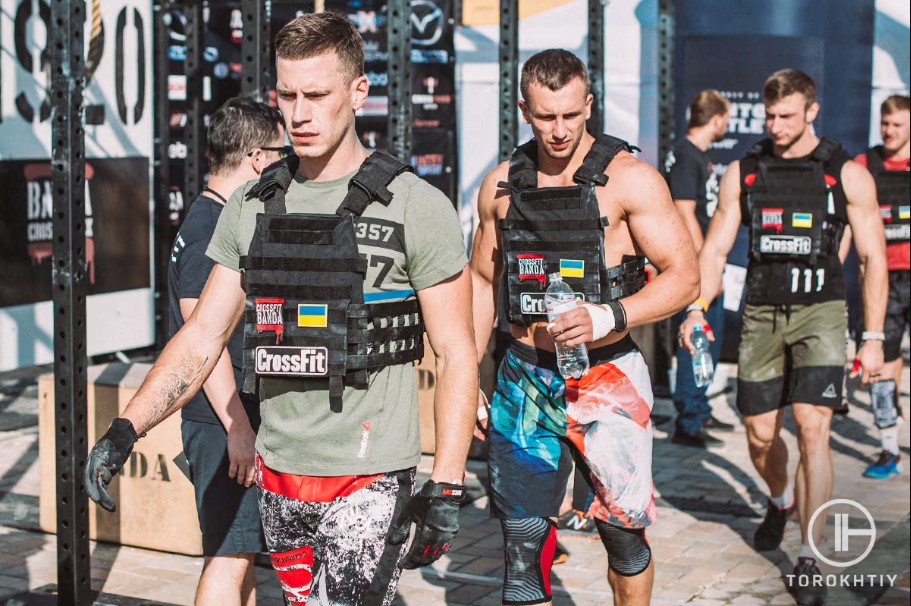
Weighted Vest Training
Weighted vests range in weight from 11 pounds to 88 pounds. The most popular sizes are 15 pounds and 22 pounds. However, not everyone needs the same weight, especially those who want to use them in timed runs.
Pick a weight that will test your strength and stamina but is light enough to perform your exercises correctly while wearing them.
While working out with weighted vest, you can do the following:
- Running
- High-intensity interval training (HIIT)
- Hiking
- Strength training
- Calisthenics
- Low-intensity steady-state training (LISS)
No matter what kind of exercise you do or your fitness goals, upper- and lower-body weight vest training could be a game-changer for your fitness routine.
Benefits of Weighted Vest Training
- One way to add force to push-ups is to put plates on top of the back. However, as the weight shifts, it can cause injuries. Putting more weight on top makes the force of gravity stronger. This way the body has to work harder to stay in balance.
- You can burn more calories by working out harder. Remember that the extra calories burned during exercise are one of the significant advantages of weighted vest training.
- Research has shown that training with a weighted vest raises runners’ blood lactate thresholds. It means they could go faster for more extended periods without getting tired.
- Using a weighted vest will help you gain increased bone strength. Preventing osteoporosis in old age has been linked to promoting bone health and strength early in life. Individuals with osteoporosis may benefit greatly from using a weighted vest.
- Training wearing a vest may help you develop stronger muscles. Since you are tricking your body into thinking it’s heavy, workouts are more manageable without a vest. The modification will let you work harder for longer.
- Because of the added load, the weighted vest improves your balance. Short-term aerobic exercise with a weighted vest greatly improves balance among postmenopausal women with osteoporosis.
- Weighted vests are fantastic for core strength because they make your core work harder to maintain balance.
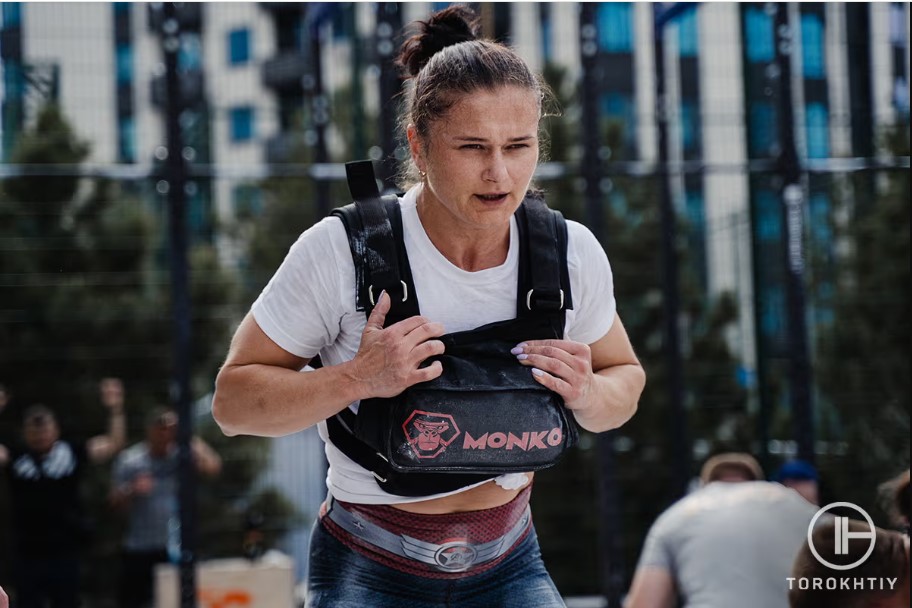
Weighted Vest Exercises
Weighted vests simplify most solo workouts. Upper- and lower-body weight vest training may transform your workout routine regardless of your fitness objectives.
Weighted vest training provides the same core-firming, bone-strengthening, muscle-building, fat-burning, energy-boosting, and endurance-boosting benefits as other weight exercises.
Pick a vest that’s 5–10% of your body weight to start, and increase the weight gradually. We hope that this list of weighted vest exercises for training will be helpful to you.
Weighted Vest Push-Ups
Nothing beats the added resistance of weighted vest push-ups when building upper body strength and muscle growth. This multi-joint exercise helps build strength in the chest, triceps, shoulders, and abs.
How to Do It?
- Put your hands farther apart than shoulder-width for a standard push-up.
- Keep your back straight and your head over your feet while engaging your core.
- lower your upper body to the ground by bending your arms.
- Apply force via your hands, and return to the initial position.
Weight Vest Pull-Ups and Chin-Ups
Weighted pull-ups and chin-ups are excellent alternatives to lat pulldowns for developing your back and biceps.
When performing a pull-up, an overhand grip of shoulder width or wider is used, while when performing a chin-up, an underhand grip of narrower than shoulder width is used. One of the finest ways to strengthen your biceps is using weighted chin-ups.
How to Do It?
- Place your hands slightly wider than shoulder-width apart on a bar to do a pull-up and grasp it with your palms facing outward.
- To keep from swinging, hang with your body fully stretched out and your core engaged.
- Raise your chin over the bar by bending your elbows and drawing in your shoulder blades.
- Slowly lower yourself back down while fully extending your arms.
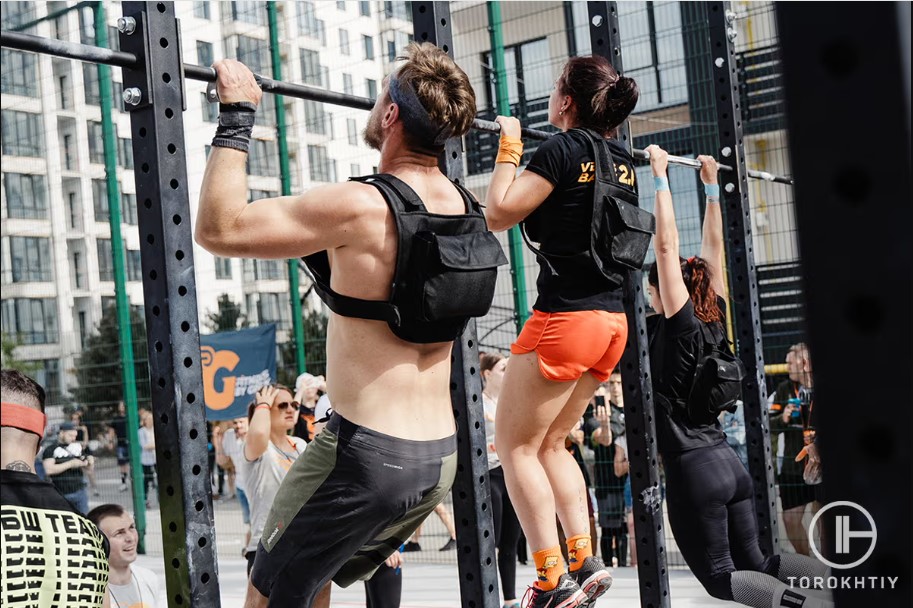
Weighted Vest Lunges
Squats are too easy, even while using a weighted vest. With lunges, you may overload your muscles more effectively because of the increased strain on your front leg. During squats, you put the same weight on both your front and back feet.
When you lunge a lot, your balance and movement will improve. To avoid injury, start with a lighter weight while making weighted vest lunges.
How to Do It?
- Stand up straight with your hands at your sides or on your hips.
- Just put one foot in front of the other and maintain your body still.
- Bring your front knee to a 90-degree angle while keeping your rear knee slightly off the ground.
- To get back to where you started, push through your front heel.
- Switch to the other leg to complete the rep and do the exercise again.
Weighted Vest Planks
Your core is made up of your rectus abdominis in the front, your obliques on the sides, and your deep transverse abdominis in the middle. You may not benefit a lot from the exercise if you can maintain a plank only for a minute or longer.
Using a weighted vest will significantly increase the difficulty and benefits of this workout.
How to Do It?
- Place your forearms on the floor, your elbows precisely beneath your shoulders, and your feet hip-width apart to form a plank.
- Maintain a rigid core and strong glutes to keep your body in a vertical line from head to toe.
- Keep your form correct and your breathing regular, and hold the posture for as long as possible.
Weighted Vest Abs Walkout
The abs walkout with a weighted vest is a challenging variation of the regular walkout. It is specifically designed to target and develop the abdominal muscles. The most important thing about this workout is always to do it correctly.
How to Do It?
- Use your arms and legs as a support base while lying on the floor.
- Move forward on the arms until the lower belly is touching the floor.
- Do it backward now.
- Complete at least three sets.
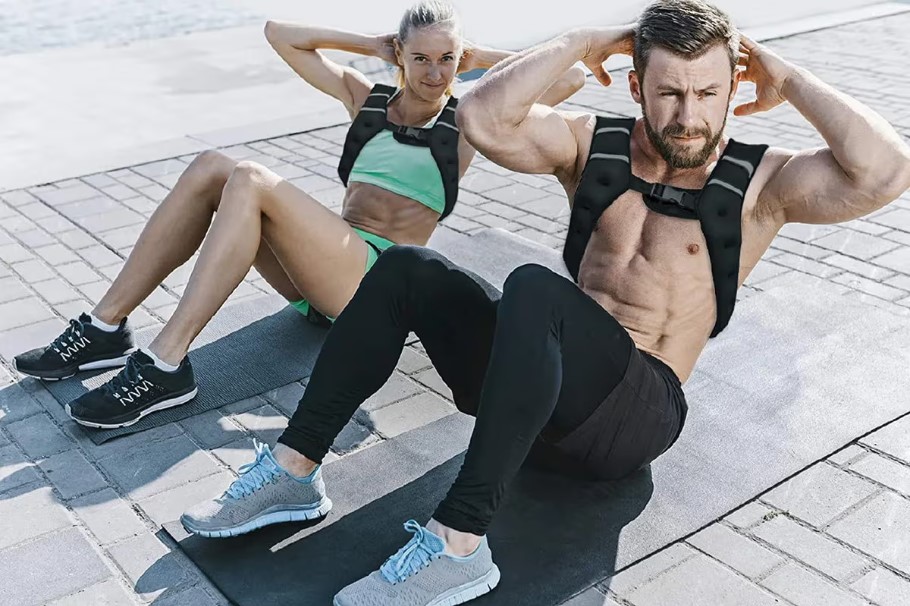
Weighted Vest Step-Ups
When you step up while wearing a weighted vest, you are improving your quads, hamstrings, and glutes. For this, you will need to use your abs to maintain your balance and stability.
Adding a weighted vest makes the workout more challenging, which is suitable for building leg muscle and general fitness.
How to Do It?
- Position yourself in front of a stable bench or box.
- Keep your chest high and your core tight as you put one foot on the bench.
- Step up onto the bench with a solid front heel push and a fully extended front leg.
- Bring yourself back down, using your front leg as a lever.
- Switch to the other leg and do the exercise again to get the necessary number of reps.
Weighted Vest Plyometric Skater Jump
Plyometric skater leaps are a fantastic addition to shake up your training routine and push yourself to new heights.
This plyometric move is excellent for improving your strength, stamina, and speed since it utilizes your whole body. All you need is a place to jump and a weighted vest.
How to Do It?
- Put the left leg through the right one’s crossed knees.
- Do a half squat after that.
- Go to the left now.
- Switch your arms and legs.
- Continue jumping from side to side.
- Try to jump in each direction at least three times.
Weighted Vest Mountain Climbers
Dynamic and high-intensity weighted vest mountain climbers are great for the heart and train the abdominals, hip flexors, and shoulders.
Choosing weighted vest workouts for weight loss gives an extra layer of resistance that helps burn more calories and develop muscle endurance.
How to Do It?
- Stand in a high plank, make sure your hands are right under your shoulders and your feet are hip-width apart.
- Maintain a flat back and active muscles by standing in a high plank position.
- Bring one knee to your chest as fast as possible without raising or twisting your hips.
- Bring the other knee to your chest as you switch legs.
- Maintain a steady speed and good form as you switch legs repeatedly.
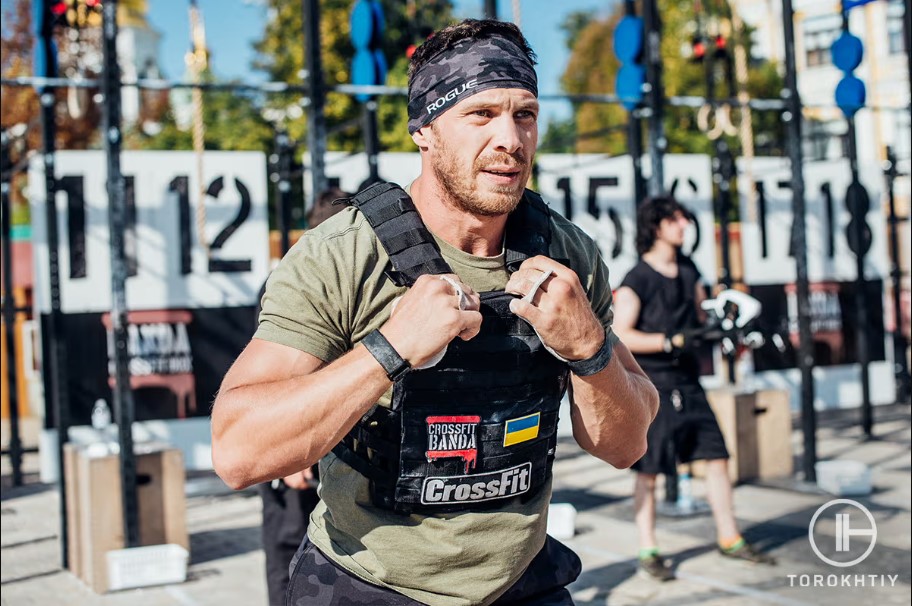
Weighted Vest Box Jump
Box jumps with a weighted vest increase power and energy. Your muscles become stronger and more durable as you work out with more weight.
How to Do It?
- Make sure the box you use is at least knee-high.
- Squat down for a moment.
- Reach back with your arms.
- To land on the box without changing your position, just jump up.
- Take a step back and do it again.
- At least four sets are required.
Weighted Vest Burpees
Burpees with a weighted vest is an excellent full-body, high-intensity workout that also improves cardiovascular fitness and agility.
Remember that weighted vests make training more challenging and rewarding.
How to Do It?
- Keep your feet hip-width apart while you are standing.
- Get down on one knee and put your hands, shoulder-width apart, on the ground in front of you.
- Just hop backward until you are in a plank position, keeping your body rigid and your abs tight.
- To do a push-up, squat down until your chest touches the floor and then push back up.
- Forward-leap back into a squat stance.
- Jump up quickly and vertically while pushing your arms up.
- Get down gently and jump immediately into the next rep.
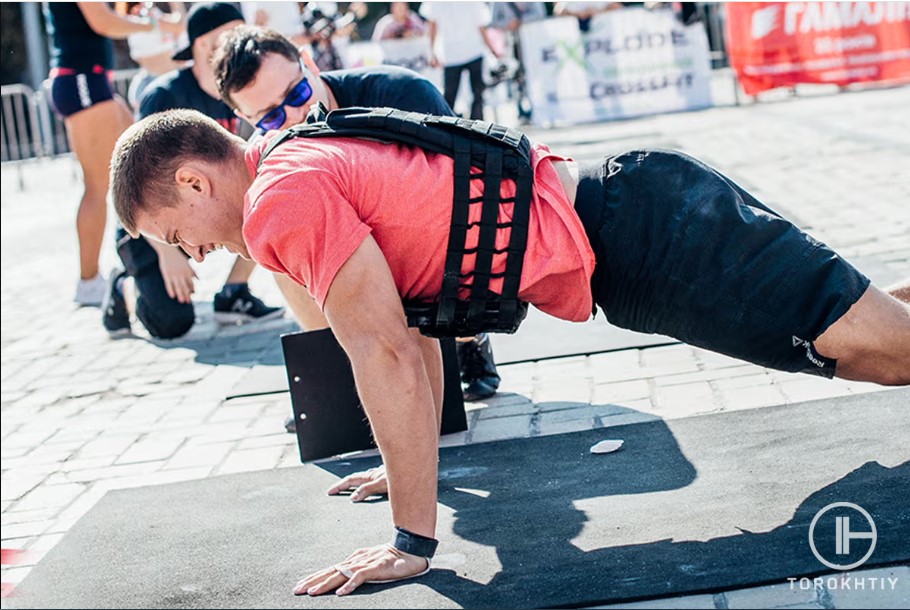
Weighted Vest Workouts
Let’s look at how you can turn that long list of best weight vest workouts into a whole routine.
You can add a few weighted vest exercises to your current workout or do an intensive weighted vest training program like the ones shown below.
Weight Vest Workout to Build Muscle
These weighted vest workout routines work for many muscle groups simultaneously. It improves fitness and health. Complete the specified number of sets and repetitions for each exercise, taking 60 seconds of rest in between.
- Do 4 sets of 8-10 reps of weighted vest squats
- Do 4 sets of 8-10 reps of weighted vest push-ups
- Do 4 sets of 8-10 reps of weighted vest deadlifts
- Do 3 sets of 10-12 reps of weighted vest lunges
- Do 3 sets of 6-8 reps of weighted vest pull-ups
Weight Vest Workout for Cardio Health
This weight vest leg workout strengthens your legs and improves your cardiovascular health. After you have warmed up complete these exercises:
- Do 45 seconds of weighted vest burpees
- Do 45 seconds of weighted vest box jumps
- Do 45 seconds of a weighted vest on high knees
- Do 45 seconds of weighted vest mountain climbers
After you complete the exercises, take a 2-minute break and do 2 more sets.
P-P-L Workout With Weighted Vest
P-P-L is short for “push,” “pull,” and “legs.” The complex exercises in this routine will work your whole body.
These exercises offer you a quick cardiovascular workout and muscle strength and development.
Complete the following in three laps:
- 8-12 sets of deficit push-ups
- 8-12 inverted-ring-rows
- 8-12 reps of Bulgarian split squats on each leg
Take a short break, and then complete the laps of the following three exercises:
- 5-8 dips
- 5-8 chin-ups
- 5-8 sets of squat leaps
The Basic Weight Vest Workout for Beginners
This routine with a light-weighted vest can help you ease into strength exercise. Do each exercise with a specified number of repetitions. Take 45 seconds of rest between sets. Do the circuit twice or thrice.
- 10 reps of weighted vest step-ups with each leg
- 30 seconds of weighted vest squats
- 10 reps of weighted vest push-ups
- 12 reps of weighted vest lunges
- 10 reps of weighted vest band-assisted pull-ups
- 30 seconds of weighted vest plank
Best Weighted Vest
The Condor Sentry Plate Carrier is adaptable and perfect for fast responses. It was designed to make it easy to carry regular plates.
The mesh shoulder pads can be taken off, and the belt can be changed to fit waists up to 46 inches around. Plate pockets make it easy to store large and medium ESAPI plates. Hook-and-loop webbing can connect a wide range of parts that can be switched out.
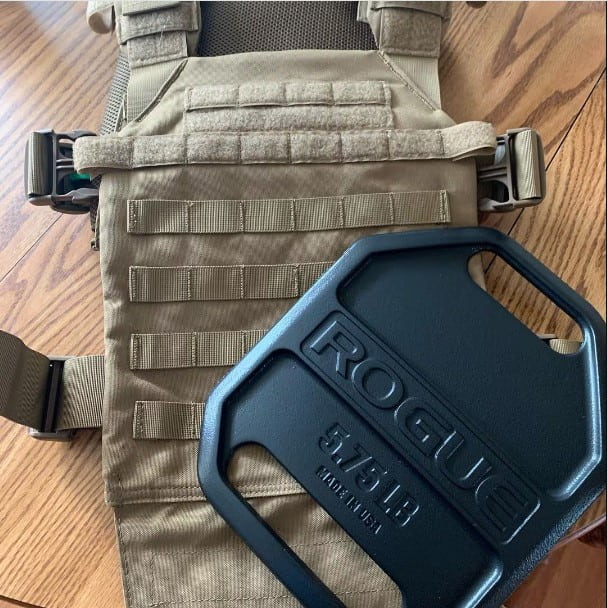
The Condor Sentry Plate Carrier is a primary plate carrier that is light, fully adjustable, and very flexible.
Product Specs:
- Available weights are 5.75 and 8.75 pounds.
- Plate pockets fit Medium and Large ESAPI plates up to 10.25″ x 13.25″.
- It has an emergency drag handle.
- You can choose from various colors (Black, Coyote, Olive Drab, Tan and Scorpion)
Sentry Plate Carrier Details:
- Easily adjusted for a satisfactory level of comfort.
- Excellent choice for those who are just getting started with their at-home workout routines.
- Straps can be adjusted for a perfect fit over the shoulders.
- Hook-and-loop fasteners on the shoulder pads allow for easy removal.
- ID patches, morale patches, and other forms of hook-and-loop webbing.
- Modular attachment heavy-duty webbing.
- Interior mesh padding.
- Shoulder straps can be adjusted.
- Easy-to-adjust buckles.
- Buckles that let go easily.
- Easy-to-reach pockets for plates.
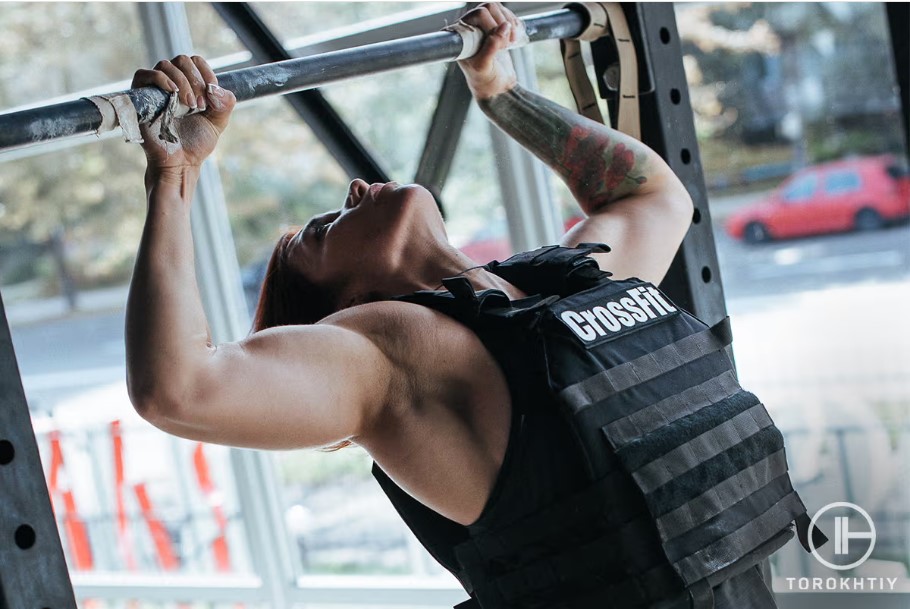
FAQ
Is It Good to Workout With a Weighted Vest?
The answer is yes, but to utilize the benefits of these vests, you will have to learn how to use a weight vest first. Remember that it will assist you in getting in shape without making your body work too hard.
Putting on a weighted vest can help improve your strength, stamina, and cardiovascular fitness.
Muscle stress and tension during exercise may alter as body mass index (BMI) changes. Remember that positive outcomes are possible since moving heavier weight needs more energy.
How Many Hours a Day Should You Wear a Weighted Vest?
Wearing a weighted vest all day is not a good idea because it can make you tired, hurt, and even burn your muscles. Stop working out immediately if the vest pulls your muscles in any way.
If you are just starting, it’s best to do fewer, shorter bursts and slowly add more time and weight. Weight vests shouldn’t hurt the body if only worn from 20 minutes to an hour.
Conclusion
Wearing a weighted vest can make workouts harder, more effective, and more demanding., You can do many different exercises working out with a weighted vest.
Also, you don’t need any special equipment or training. If you do this, you will see the changes immediately.
A weighted vest is a great thing to buy to strengthen your heart and bones. They help you build muscle, lose fat, and get stronger. They cost little money and push you to go as far as possible during workouts.
You can use a weighted vest in many ways, making it a great addition to your gym gear. Choose an activity from the list above and use the comment section to share your thoughts or ask questions.
Also read:
- Best Weighted Vest
- Best Weight Vest For Calisthenics
- Weighted Vest for Running
- Benefits of a Weighted Vest
- Benefits of Walking With a Weighted Vest
References:
- Guide to Exercising with Weighted Vests // HealthLine: https://www.healthline.com/health/fitness/weighted-vest-benefits
- Effects of weighted vest training on sprint-running // PubMed: performancehttps://pubmed.ncbi.nlm.nih.gov/31070108/
- Effects of aerobic exercise in postmenopausal women with osteoporosis // PubMed: https://pubmed.ncbi.nlm.nih.gov/22441962/
- Best Weighted Vest Exercises for Building Muscle // MensHealth: https://www.menshealth.com/uk/workouts/g37892000/best-weighted-vest-exercises/
- How to Do Weighted Step-Ups // VeryWellFit: https://www.verywellfit.com/weighted-step-up-exercise-3120001
- Training With Weight Vests // UltraRunning: https://ultrarunning.com/featured/training-with-weight-vests/
- Benefits of Exercise vs. Diet // HealthLine: https://www.healthline.com/health/exercise-and-weight-loss#benefits
Why Trust Us?
With over 20 years in Olympic Weightlifting, our team does its best to provide the audience with ultimate support and meet the needs and requirements of advanced athletes and professional lifters, as well as people who strive to open new opportunities and develop their physical capabilities with us.
By trusting the recommendations of our certified experts in coaching, nutrition, dietology, and sports training programming, as well as scientific consultants, and physiotherapists, we provide you with thorough, well-considered, and scientifically proven content. All the information given in the articles concerning workout programming, separate exercises, and athletic performance, in general, is based on verified data. We ensure that you can rely on our professionals’ pieces of advice and recommendations that can be treated as personalized ones which will benefit you and fully meet your needs.
The product testing process is described in more detail here
Author: Ihor Shymechko
Pro Olympic Weightlifter, Coach
Best Results: Snatch – 208 kg,
C&J – 240 kg
Ihor has been a professional weightlifter since 1996, boasting over two decades of competition experience. His notable achievements include clinching the European Championship in 2009 and securing a silver medal in the 105kg division at the Senior World Championships in 2011. Ihor represented his country in the 2008, 2012, and 2016 Summer Olympics. After retiring from competitive weightlifting, he transitioned to coaching, leveraging his vast experience to guide athletes who now compete on both national and international stages.

